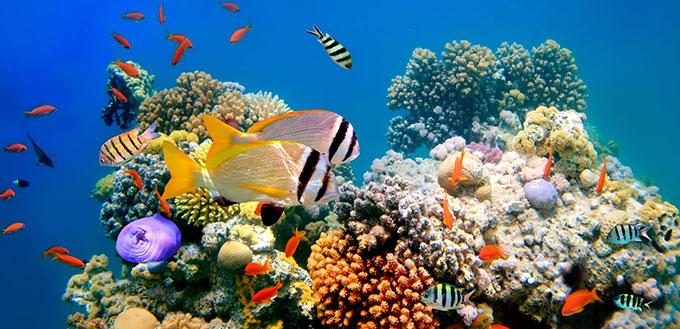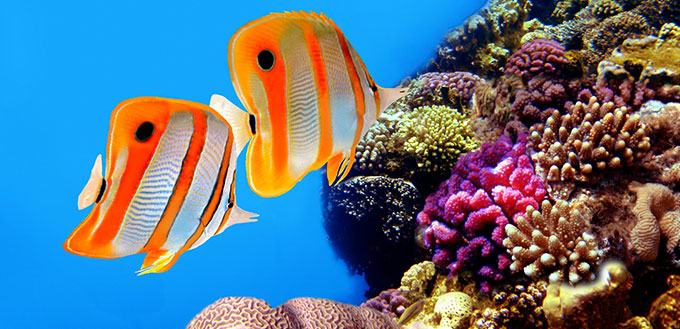It is generally a widely known fact that most creatures on this Earth are made up mostly of a whole host of minerals and, of course, water. How we keep up with that constant need for water in our bodies is by drinking. But what if you’re submerged in water all day long? Do you still need to drink? And, if you do, wouldn’t the salt water from the sea be bad for them? We answer these questions and many more, below.

Do Fish Get Thirsty?
Like all living beings, fish do indeed become thirsty. They require water to fuel their cells and therefore their body, despite their natural habitat being that they are surrounded by water! However, just like us humans, fish should not drink water which is saturated in salt, so the question then becomes, how do fish keep themselves hydrated and do fish drink water?
Do Fish Drink Water?
In a way, yes, fish do indeed drink water. Of course, they aren’t able to drink water in the same way that we land mammals can. While fish can, technically, get their intake of water through the mouth in the same way that we can, this is usually only done in emergencies.
The idea of fish drinking water might seem a little odd but the way that fish drink water is completely different to how we might find ourselves quenching our thirst. Naturally, they aren’t able to grab a glass of pre-filtered and cleaned water that comes from a thorough system that allows for bad bacteria to get killed off, so they require a more detailed system in order to quench their thirst.
There are also two different sets of rules as to how fish will get their water, depending on what kind of water they live in. The differences between saltwater and freshwater fish are very distinct – and very important if you’re looking to house fish in your tank.

The Basics About Fish Drinking Water
Being that fish are surrounded by water, and that they can seriously damage their health if they also intake high levels of salt, fish have evolved to get their clean, usable water through a completely unique system to us. Instead, fish are able to absorb water through their skin, as well as via the gills.
This system is called osmosis and it’s a very important part of every living being’s system. Osmosis is, by definition, “a process by which molecules of a solvent tend to pass through a semipermeable membrane from a less concentrated solution into a more concentrated one”. In other words, if a fish is dehydrated, and lacking water, they can absorb the water through the semi-permeable membrane of their skin.
If you can imagine a very tightly woven net, this allows water molecules to pass through, while the larger salt molecules can’t fit through the gaps. This allows fish to stay completely hydrated by ensuring the same level of water is available throughout their body and it’s actually the same process that our cells use after we drink water, to keep us hydrated.
However, that’s not the end of this little science lesson. Indeed, as aforementioned, there are distinct differences between saltwater and freshwater fish. When fish live in freshwater, there is a greater amount of salt within their bodies than in the water (freshwater has a salt content of less than 1%). This means that the osmosis works by keeping those essentials salts inside the body, while the water can still pass through. They also use chloride cells within their gills, which helps to maintain the levels of sodium and potassium that pass through their system by creating a special enzyme that is used to process these levels. This allows the fish to keep just the right amount of salt in their bloodstream, without overloading the system (and we speak about these dangers, below).
For saltwater fish, however, the process of osmosis is not always enough to ensure that they maintain healthy levels of salt levels in their body. For these fish, in order to stay hydrated, they are also required to gulp down water, orally. This means that their kidneys need to work overtime in order to process the salt, however they also use the same chloride cells to help filter the salt levels and, instead of retaining the salts, they pump this out of their system.
Naturally, this means that your fresh or saltwater fish should always be kept in a similar environment to the one that they are used to. If a saltwater fish were to be placed in a freshwater tank, their body would not be able to compensate for the change in salt concentrations. Saltwater fish require a very high level of salt in their bodies in order to maintain optimal function levels. In an attempt to intake the right levels of salt for their bodies, they would try to absorb too much water – leading to them flooding their own system with water molecules and become bloated before dying – possibly even exploding.
Similarly, if you placed a freshwater fish in saltwater, the act of osmosis would lead the levels of water molecules inside your fish leaving the body and entering the surrounding water. This will cause your fish to quickly become dehydrated, shrivel up due to a lack of water and eventually die from dehydration.
For this reason, it’s very important to keep your pet fish in the right tank system for them. Always read into the natural environment of the species you choose and change up your tanks salt levels in order to best suit their needs.

Do Sharks Drink Water?
Contrary to popular belief, sharks are actually fish – not mammals – and so they use the same system as any other salt or freshwater fish. In other words, they also use osmosis and their chloride cells to help maintain healthy levels of salt in their bodies. However, just like other fish, there are both fresh and saltwater varieties, so sharks drink water in their own, unique ways.




